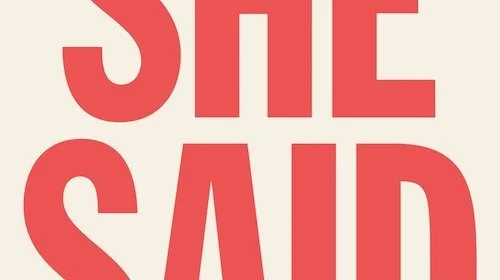Best Adapted Screenplay: Ranking Every Oscar Nominee
Written by Andreas Babiolakis
Yesterday we looked at the Best Original Screenplay category and admired the creativity of the writers that were nominated (we had quite a strong batch of nominees, too). I usually feel like the Best Adapted Screenplay category pales in comparison when it comes to who gets selected, and I do feel like this year’s adaptations aren’t quite as strong as the original screenplays are, but they’re not too shabby overall. What is unfortunate is that the difficulty of making a good adaptation gets lost in the midst of the rewarding of so-so works merely because they are popular (that’s not a take on this year’s nominees, but in general). Again, this year’s five hopefuls are all good in their own way, but I do feel like it is quite easy to rank these in order from worst to best (in fact, each place is so obvious in my mind). Let’s not waste any time. Here are your nominees.
Biggest Snub: She Said-Screenplay by Rebecca Lenkiewicz
I sadly expected the underrated She Said to be overlooked in many ways, but I at least felt as though it would have gotten some recognition for Rebecca Lenkiewicz’s screenplay, especially since this journalistic drama is so dependent on it. She adapts the source novel — and the New York Times article both works are based on — really well, and balances the influx of information through steady pacing and precise orders of prioritization. I feel like She Said didn’t get enough flowers in general: it’s a solid film that works on a number of levels. Relaying information is one of its best qualities (not to mention its handling of real people and their traumas and/or monstrosities is done extremely well).
5. Top Gun: Maverick-Screenplay by Ehren Kruger and Eric Warren Singer and Christopher McQuarrie, Story by Peter Craig and Justin Marks
To me, Top Gun: Maverick is written as a nostalgia fest from start to finish. This is for better or for worse. Allow me to explain. I feel like it builds upon the original Top Gun film and provides higher stakes and more interesting ideas, but I also feel like Maverick is so indebted to its source material that it is almost a carbon copy at times. What I will say is Top Gun: Maverick is quite better than Top Gun, and improving upon a previous source is definitely a plus. I also do understand that the film was made to appeal to fans of the original film (of which I am not, outside of its music), and that much of the storytelling decisions hinged around this viewer-base. Still, I think it’s a decent screenplay with some highs (can’t deny the occasional moments of euphoria and/or tension), but it’s definitely the weakest one here.
4. Glass Onion: A Knives Out Mystery-Written by Rian Johnson
On one hand, Glass Onion is better than Knives Out, but the other major issue is that it is still too damn obvious who the main villain is. At least the actual crime itself is far more difficult to figure out in this sequel (it also felt like it barely mattered in Knives Out when every suspect is a highly unlikeable shithead), but a whodunnit feels kind of pointless when you can solve it as quickly as the hotshot detective at the centre of this case. What I will admit is that Rian Johnson made some really likeable characters in Glass Onion, and getting trapped with these eccentrics is actually kind of fun (you can absolutely make odd characters that don’t have to annoy the audience to the point of us not caring). Glass Onion is stronger in the writing department, but it’s still not bulletproof.
3. All Quiet on the Western Front-Screenplay: Edward Berger, Lesley Paterson & Ian Stokell
A perfect adaptation of this classic novel already exists, and it won Best Picture back in 1930. Still, what I like about this version of All Quiet on the Western Front is that it is a different approach to what we’ve already been familiarized with. Both the first film and the novel tether us to new soldier recruits that are wide-eyed and excited to protect their motherland (Germany), only to find that war is worse than hell; we eventually see what life is like post-battle for those that survive. This latest All Quiet on the Western Front has something else to say. We actually see the calls-for-truce being discussed and brushed aside by those that have the authority to cease the fighting, and then we subsequently witness all of the innocent people that die because the first World War was prolonged: it’s almost a gauge of how many lives were lost with each act of stubbornness. It’s a unique approach to a story we’ve seen time and time again, and that alone makes this adaptation of All Quiet on the Western Front interesting.
2. Living-Written by Kazuo Ishiguro
Ikiru is one of my all time favourite films, and the thought of a remake just didn’t sit well with me. However, if you can trust anyone to take an ordinary concept (like adapting a classic) and make it meaningful, it’s Kazuo Ishigiro (one of the best writers of our time). Ishigiro saves Living from being a stale, lifeless remake by making this adaption poetic and profound. While Living loses some of that dread that Ikiru is driven by, it is a far more optimistic look at the morbid topic of death, but Ishigiro doesn’t get schmaltzy or safe with this discussion either. Instead, the author is level headed and real, and it makes the theme of losing someone feel serious yet beautifully handled. We could have had a rotten egg with this remake, but instead we got a film worth watching.
1. Women Talking-Screenplay by Sarah Polley
Sarah Polley’s take on Women Talking is the adaptation that I loved the most of this category, and I think it’s barely even a contest. Firstly, I think it’s extremely tasteful with how it handles traumatic subject matter, and so much of that comes from Polley’s tender approach as both a director and a writer. Then we can look at how Polley takes Miriam Toews’ novel and made it exciting on the big screen, despite the limited sets and roster of characters. I hung on to every word spoken in Women Talking, and it’s not just due to the highly talented cast (which I am still mad didn’t get a single nomination) but because of how captivating the dialogue, pacing, and character dynamics were. For me there is no other winner: it has to be Women Talking. It flat out was one of my favourite screenplays of any kind of 2022.
Who I want to win: Women Talking. Not going to beat around the bush.
Who I think will win: For now, I think this is going to Women Talking. Most Best Picture nominees are graced with at least one Academy Award win if their categories permit them. Women Talking only has one nomination: for Best Adapted Screenplay. Top Gun: Maverick will win in other categories, and two of the other three nominees aren’t Best Picture candidates. The only possible competition I can see is All Quiet on the Western Front, but that’s only if the German film goes for the landslide across most categories (which I don’t foresee happening, although it likely has Best International Feature Film in the bag and some tech awards to boot). Because of this, I’m sticking with Women Talking. One final point to make: each category is nominated on by the industry members of each profession (so Adapted Screenplay is voted upon by writers). Best Picture is voted on by all Academy members. Women Talking got by mostly on the love of those that voted for the sole other nomination it got: for its screenplay. I think there are many fans that will be voting for it to eventually win an Oscar.
Tune in Monday for our next Academy Award category! We’re reviewing every single nominee on every weekday.
Andreas Babiolakis has a Masters degree in Film and Photography Preservation and Collections Management from Toronto Metropolitan University, as well as a Bachelors degree in Cinema Studies from York University. His favourite times of year are the Criterion Collection flash sales and the annual Toronto International Film Festival.









